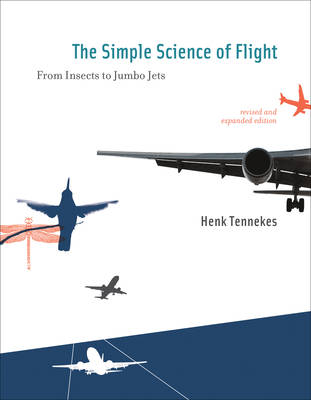
- Afhalen na 1 uur in een winkel met voorraad
- Gratis thuislevering in België vanaf € 30
- Ruim aanbod met 7 miljoen producten
- Afhalen na 1 uur in een winkel met voorraad
- Gratis thuislevering in België vanaf € 30
- Ruim aanbod met 7 miljoen producten
Omschrijving
From the smallest gnat to the largest aircraft, all things that fly obey the same aerodynamic principles. In The Simple Science of Flight, Henk Tennekes investigates just how machines and creatures fly: what size wings they need, how much energy is required for their journeys, how they cross deserts and oceans, how they take off, climb, and soar. Fascinated by the similarities between nature and technology, Tennekes offers an introduction to flight that teaches by association. Swans and Boeings differ in numerous ways, but they follow the same aerodynamic principles. Biological evolution and its technical counterpart exhibit exciting parallels. What makes some airplanes successful and others misfits? Why does the Boeing 747 endure but the Concorde now seem a fluke? Tennekes explains the science of flight through comparisons, examples, equations, and anecdotes. The new edition of this popular book has been thoroughly revised and much expanded. Highlights of the new material include a description of the incredible performance of bar-tailed godwits (7,000 miles nonstop from Alaska to New Zealand), an analysis of the convergence of modern jetliners (from both Boeing and Airbus), a discussion of the metabolization of energy featuring Lance Armstrong, a novel treatment of the aerodynamics of drag and trailing vortices, and an emphasis throughout on evolution, in nature and in engineering. Tennekes draws on new evidence on bird migration, new wind-tunnel studies, and data on new airliners. And his analysis of the relative efficiency of planes, trains, and automobiles is newly relevant. (On a cost-per-seat scale, a 747 is more efficient than a passenger car.)
Specificaties
Betrokkenen
- Auteur(s):
- Uitgeverij:
Inhoud
- Aantal bladzijden:
- 216
- Taal:
- Engels
- Reeks:
Eigenschappen
- Productcode (EAN):
- 9780262513135
- Verschijningsdatum:
- 1/10/2009
- Uitvoering:
- Paperback
- Formaat:
- Trade paperback (VS)
- Afmetingen:
- 180 mm x 225 mm
- Gewicht:
- 362 g

Alleen bij Standaard Boekhandel
Beoordelingen
We publiceren alleen reviews die voldoen aan de voorwaarden voor reviews. Bekijk onze voorwaarden voor reviews.











